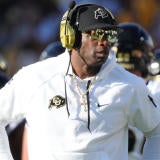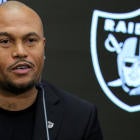I caught up with Connecticut athletic director Warde Manuel on Wednesday about the aftermath of conference realignment and the Huskies’ place in it. I wrote on this topic Tuesday: Expansion is on pause, the power-conference gulf has widened, so what now for old Big East members UConn, Cincinnati and South Florida?
As schools fell off the old Big East like slow-cooked ribs off the bone, straight into Jim Delany's or John Swofford's money pools, Manuel got this question from alumni: Why isn't UConn in another conference? Realignment has been a "big part" of the conversation with boosters over the last few years, Manuel said.
His answer? Well, he would rather not rehash, he says, but he's confident his fan base has processed the reality and moved on. The five power conferences are expected to make at least $100 million more than the old Big East (now the American Athletic Conference) over the course of the American’s reported seven-year, $126 million deal with ESPN ending in 2019-20.
"I don't need to rehash the rationale to other people's decisions," Manuel said. "We want to put ourselves in the position to have success in the conference. ... We talk [with boosters] about where we are, my perspective on how we look at it going forward."
Here are some other highlights from my talk with Manuel, who doesn't want the college football arms race to define UConn.
"Any conference we've been in has not made UConn who we are," Manuel said.
Dealing with the growing revenue gulf: "There has been a big revenue gap between many conferences for some time. There is significant revenue gap within conferences from the highest to the lowest school, and you compete. I'm not going to make excuses because other conferences share more revenue or others bring in more revenue, that we're not going to compete. Based on plans we have, we are in a great position to compete. We have great support among fans and donors. We have great support with corporate sponsors and within the state with our fans."
On being on the wrong side of the revenue fence: "I don't know anybody who wouldn't tell you they couldn't use more money. Even colleagues at our schools that have a lot of money are always looking for increased revenue streams. I'm not going to make any excuses. We're going to be fine."
On ways to increase equity: "Winning is No. 1. Marketing. You look at increasing of tickets, you look at donors, increasing the number or level of donors to the department to either direct support of football and in general so you can do more around it. You can look at increase of media, what other conferences are doing with cable networks, though we don't have that. You can grow the size of your stadium, the support of a larger fan base. If you look around the country, there are different models being used at different points in time at different institutions."
On having no reaction to the ACC securing a grant of rights in late April: "Each conference is going to make decisions that are in their best interest. I don't have a reaction for that."
On why UConn isn't in another conference, and why there's optimism for the American despite perception: "We really are looking forward to the conference. There's a whole host of reasons things have happened the way they did. You probably know them and have heard them as well as I've heard them. It is where it is right now. We have a great group of ADs. We're starting [officially] July 1. Going into it, everybody's positive about it. We're growing the value. You start off with the individual brands coming in. Then you grow the conference brand. How you play and what you do will help determine the future."
On league-wide distribution from the American's "Realignment reserve fund" of nearly $70 million (CBSSports.com reported UConn, Cincinnati and USF will get multi-million-dollar installments over four-to-five-year period): "Nothing is official at this moment. Presidents are going to review this [at the spring meetings in two weeks]. I think it's fair and balanced for everybody. We're not approaching this as win-at-all-costs situation. This is a new league. We have new partners."
On realignment payments keeping UConn closer to old Big East deal (paying $7 million to 10 million per school, depending on incentives) for the next 4-5 years: "We should be fine based on all the parameters we know right now. We should be made whole from that perspective."
On whether new membership can score a better media rights deal in 2020: "Sure. By then we can be better as a conference and extract more value in media rights once our television partner sees what we're doing as a conference and you hope you’re in a position to be stronger and have proven success."
On whether realignment is over: "I don't know. Since the NCAA has been around, since formation of the NCAA [in 1906], if you look at the history, there's been realignment of conferences for different reasons. I don't proclaim to know if it will ever be done again. History will tell me at some point there's going to be shifts."
On the mentality of the UConn athletic department: "We're still going to be UConn. We're going to focus on being great at what we do and winning championships in the league we're in."




















